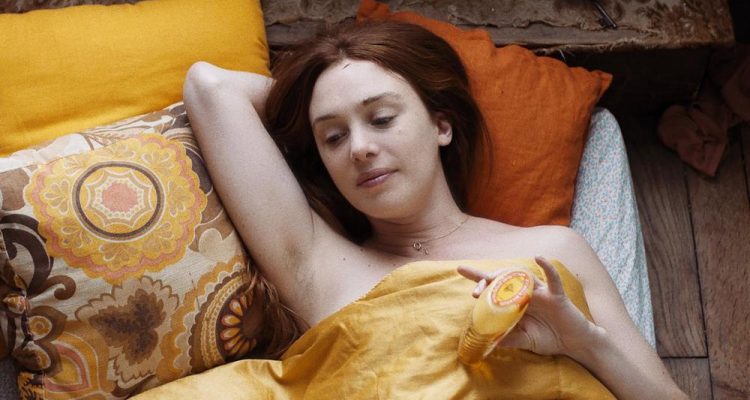A woman pleads “Open the door!!” in a tiny corridor, banging away with her fist and head. Such is the frenetic opening scene of Léonor Serraille’s “Jeune Femme” — the story of Paula as played by an unforgettable Laetitia Dosch in a star-making turn — and not only is it a fitting metaphor for Paula’s predicament throughout the course of the film, but the zest, zing and determination felt in those opening seconds ripple throughout the entire next hour and a half. Premiering in the Un Certain Regard sidebar of the Cannes Film Festival, Serraille’s debut feature is a roaring triumph that has overshadowed many of the bigger titles in and out of Competition due to its raw tenacity, sizzling humor and Dosch’s tour-de-force performance. Its closest English-language equivalent would be “Frances Ha,” though there are shades of “Juno” and “Young Adult” in Paula, too, as well as the infectiously charismatic verve of “Amélie.” And yet Paula is still very much her own flesh-and-blood character, even if she shares some familiar traits when it comes to on-screen free-spirited women.
READ MORE: Cannes: Netflix & Yorgos Lanthimos Lead The Buzz On The Croisette
The desperation felt at the front door of her boyfriend’s place introduces an extended opening sequence of Paula explaining her volatile behavior to a befuddled male nurse. Delivering a flurry of tangents during her viciously funny monologue, Paula explains how Joachim (Grégoire Monsaingeon), her photographer boyfriend, kicked her out of his place now that he’s found another muse. We find out that she’s not close with her parents, and how they’ve been politely staying out of each other’s way since she was about 15. Insisting that she’s calm and doesn’t need help (when the opposite couldn’t be clearer), the humorous tone turns a sharp, swift corner when Paula, teary-eyed and quivering, whispers, “I used to be everything to him, now I am nothing.” Serraille’s dramedy has begun its impressive balancing act, and Dosch has already captivated us.

Paula’s wayward ways around Paris and her direct approach with strangers — including an amusing interaction with security guard Ousmane (Souleymane Seye Ndiaye) about the size of his suit — reveals the loneliness that’s hidden beneath the jovial, bonne humeur surface. She tries to stay at her friend’s place and gets rejected. She goes to a house party, loses herself in the music with some serious dancing skills, but then bolts out of there when another guest gets, hilariously, too familiar. “Oh, don’t worry,” he says, “I’m in the champagne business!” But Paula has her limits, and Serraille’s screenplay does a tremendous job of anchoring the character with these sober reactions, lest she gets too unrestrained and becomes a pastiche of the kind of free-spirited young woman we’ve seen in countless films before.
Down in the dumps, with nothing but a bag of clothes and a cat by her side, all hope seems lost for Paula until she runs into Yuki (Léonie Simaga) in the subway. Yuki mistakes her for an old schoolmate and makes it easy for Paula to play along. You’d think that at this point, there could be some hesitation over Paula’s morals about slipping into someone else’s identity, but we’ve already spent practically every frame with her, falling in love and knowing that she’s just a desperate, lonely girl with a heart of gold. Meeting Yuki lifts Paula’s spirits; she ends up getting two jobs, starts feeling more confident, and begins slowly getting over Joachim.

Serraille’s direction is as tight as it is free-floating, perfectly suited to Dosch’s work as Paula, a character that can sparkle with life or express a poignant sorrow that pinches the heart each and every time. This duality within Paula’s capricious nature, like the overall balance of spit-fire comedy and tender drama through “Jeune Femme,” is visually symbolized through her heterochromatic eyes. It is, after all, from her perspective that we see the world in this film, and it’s always a shade of green and grey, never black and white. Combined with Clémence Carré’s excellent editing work, Serraille’s screenplay lands every punch-line and stays with every reaction shot just long enough to get the total effect without overstaying its welcome.
This impressive show of cinematic flair heralds Léonor Serraille as an exciting director to watch. The film may use a familiar rags-to-riches concept, but the sense that all of Paula’s actions (the good and the bad) are independently hers and hers alone grounds the film in realism and only makes you appreciate the character even more. The doggedness she shows after all that life throws at her is inspirational. Dosch, though she’s been appearing more and more in French films of recent years (including Maïwenn’s “My King”), will make heads turn in the role of her career thus far. Her Paula is instantly charming, never too outrageous, hilarious and supremely sympathetic. She will steal your heart. [B+]
Check out the rest of our coverage from the 2017 Cannes Film Festival by clicking here.

